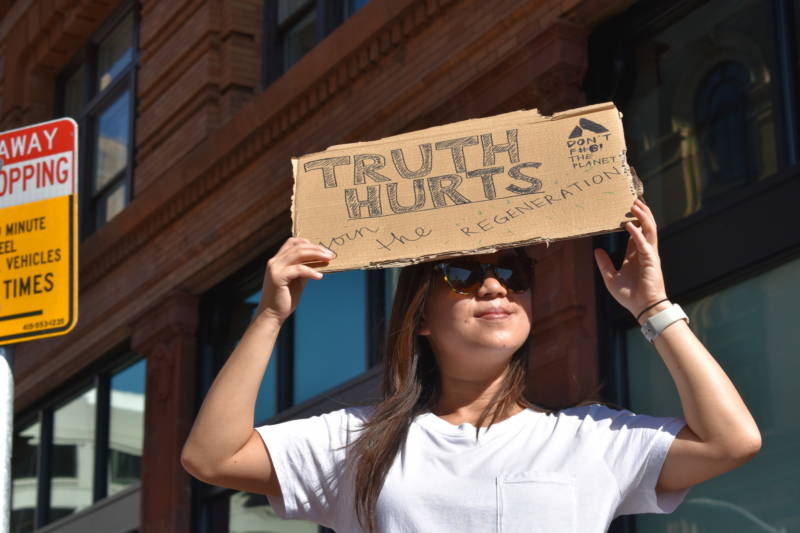The climate change crisis can be overwhelming, triggering crippling fear and sadness in some people. Some call it eco-anxiety, some call it climate grief.
How You Are Feeling About Climate Change (and Tips on Overcoming Fear, Grief)

That makes it hard sometimes for people to face global warming — not because they don’t care, but precisely because they do: “I think it’s actually the fact that we do care very deeply. But the experience is one of feeling overwhelmed, feeling powerless,” said environmental psychologist Renee Lertzman. “As individuals, we are very easily led to feel that we are insignificant.”
We wanted to know how our audience was experiencing climate grief, so we asked on Twitter, and got a range of responses — from difficulty making big life decisions to having concern for kids, from accepting that the fear is based on real threats to using those threats as motivation to get involved.
Here are some of your responses:
Nic Eaton said he and his wife spoke about decision-making “with climate catastrophe ahead” and that they were “feeling utterly incapable of making appropriate decisions.”
“By which I mean worthwhile decisions. Should we just say fuck it and roll the dice? Do all the things we want to do now regardless of future implications?” he wrote. “Do we play it safe? Do we build a bunker? Can our lives have meaning even in the event of collapse?”
Others, with kids, expressed worries about their future.
“I have very young kids and I don’t know how to talk to them about the world anymore. I don’t know how to describe the future, or their future,” wrote Ryan Moulton. “I feel like I have to pretend that their life will be similar to mine, even though I know that it’s likely that it won’t be.”
For some, their fear is based on personal experience. Dr. Eki Shola Abrams said her family drove through flames to escape the 2017 Tubbs Fire in Northern California. She has had eco-anxiety ever since.
“I appreciate this deeper awareness of climate change yet it has sometimes paralyzed me with fear … I constantly ask myself, ‘Do I need this?’ when thinking about buying replacement items we lost in the fire,” she wrote in an email to KQED. “Teaching my children to recycle knowing that a lot of it will inevitably end up in landfills is very unsettling.”
For some, processing their anxiety can take the form of grief. People have gathered in places like Iceland and Switzerland to memorialize glaciers as though they were humans who had passed away.
For Katy M, the grief comes in “waves. Guilt, helplessness, hopelessness, depression.” Daniel Jin said he feels it every day.
“It’s an ever-present anxiety that grows and recedes but never leaves,” Jin wrote. “Sometimes it’s a dull ache that gnaws at the present moment, and sometimes it’s acute and all-consuming.”
And yet others defined grief like this:
Craig Chalquist, a psychologist and professor at the California Institute of Integral Studies, said all of these feelings are normal.
“The human mind is built such that it protects itself by defending itself against intolerable information,” he said. Such defenses may include “surfing away from the bad news,” regressing to a childlike state and expecting someone else to take care of the issue, denying that the problem is happening or believing in a silver-bullet solution.
Eco-anxiety can be managed. Experts suggest processing feelings, meeting with allies, identifying problems — and getting to work.
Some of those who responded to us said they’ve used their feelings as inspiration to act.
“The only way I find to cope is to do something about it: to take action demonstrating and working for change,” wrote Avery Blueberry.
Rhiannon, founder of online support group Parents for the Planet, said they’ve developed a series of coping steps on this issue.
“The important things in our experience are acknowledging it and also fighting an understandable temptation to freeze or hide instead of act,” she wrote.
Abrams, the Tubbs Wildfire survivor, said she has developed coping tools, too, like writing music about the pain. She has also become certified in a training program to help others in her community build resilience. “Being a part of this resilience community has allowed for open and safe discussions about climate change, trauma and much more,” she said.
Not everyone felt down about the days ahead. Some even said they felt hopeful, like Adela P.
“Perhaps the pendulum has to swing this far before it forces humanity to evolve,” she wrote. “We have the tools — let’s implement them.”
